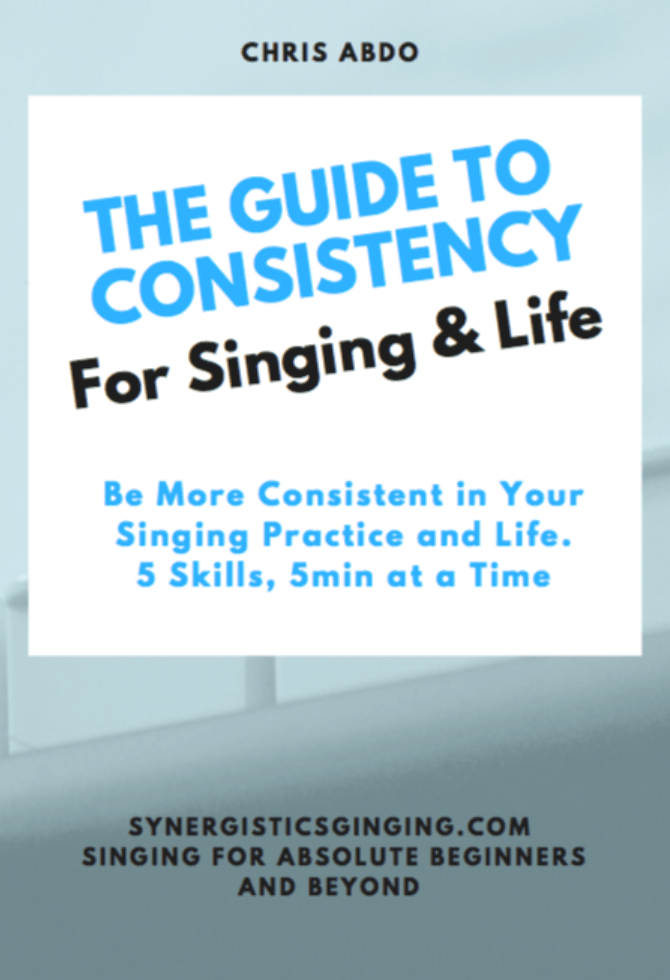Where to Start as a Beginning Singer
What is the first year of working on your singing going to be like? If you are a beginning singer, this article will cover the main things you’ll work on as a beginning singer, if you are an experienced singer, this article will help you start off lessons or technique work on the right track by covering any gaps in your skill sets that you’ll need to address before moving forward.

As a beginning singer, I had below-average abilities, or rather, I had zero natural ability or talent for singing. This, I found, was very unique. Most singers that walk into my studio are at least a little bit ahead of where I started from, right from the outset. So I feel a special delight when I find a new student that really is starting from scratch, like I did. A kindred spirit if you will 
When I took voice lessons, every teacher I worked with started out as a singer who was already talented at singing. So when I couldn't match a single pitch, they looked at me with puzzled eyes, they were not really sure what to do with me. I hope that has changed with other voice teachers these days, but from what I can glean from youtube, most teachers skip ahead of the absolute beginning steps you need as a beginning singer (especially if you are starting from where I started from).
As a result of this, you may work with a teacher other than me who may not know where to start you from. This article will help you bridge that gap. This is nothing against other teachers: you simply don't know what you don't know. I'm always working to account for everything I don't know, and I humbled and grateful for the singers, teacher, and students in my life that have helped me in that way.
Questions? Comments? Let me know!
Where to Start: Assess!
So the first thing you need to do is ASSESS your current skill level. The most important skill for "sounding good" as a singer it the ability to sing in tune. Like aim in basketball, no singer is ever done working on that skill.
Now I want to be clear here: singing in tune is not the most important skill for singing as a whole, it's just the most important skill that needs to be solid before you sing a song in public. So it sounds good. This is because, on the whole, most everyone agrees you need to sing in tune for it to sound good...or be closer to sounding good.
So what you want first off is assess your skills for singing in tune. The reality with singing on key (or in tune, or on pitch, these all mean the same thing) is that really there are multiple skills working synergistically together that enable your voice to be in tune.
How do you know if you can sing in tune with another singer?
First Question:
Can You Sing In Tune with Another Singer in a Comfortable Vocal Range?
You can take a recording of yourself singing with a recording of a slow song from a singer that is the same gender as you, send that off to a trained musician (voice teacher would be even better) and ask them "hey, is this in tune?". Or in a voice lesson it takes 5min.
How do you know if you can sing in tune with a piano note?
Second Question:
Can You Sing In Tune with Single Notes on the Piano in Comfortable Vocal Range?
Then repeat this process by recording yourself singing with individual notes on the piano. Not sure which notes on the piano? Check out my "Find Your Range" kit which shows you exactly where the most common vocal comfort zone ranges are for men and women and where that is at on the piano.
You can also check out the SingTrue app. This is a handy little app that will show you if you are matching your note.
If you already sing in tune and know without a doubt that you can sing in tune with individual notes on the piano, then you’ll need to get a sense of your vocal comfort zone. This means you want to get know where it is the MOST comfortable for you to sing when it comes pitches, vowels and volumes.
Once you've mapped out your Vocal Comfort Zone, you're now at a MUCH better place to work on exercises, because you won't be forcing your voice too high or too low, which can train ingrained tensions habits in your singing that take 5x as long to unlearn and get out of your singing.
Now...
What exercises should you do?
There are a few different types of exercises that nearly all singers need to work on to varying degrees in their singing:
1. "Get Used to Singing" exercises
2. VPI exercises
3. Skill specific exercises
4. Song-specific exercises
The most important types to work on when you first start singing or if you are an experienced singer who is just now beginning to work on your vocal exercises are the “Get Used to Singing” Exercises and the VPI Exercises. So we’ll focus mostly on those for this article.
The "Get Used to Singing" Exercises:
The very first thing you want to get used to is simply singing vowels on long notes. So you can start with the Single Note Exercise on an "ah" as in the word "saw", being sure to sing in your Vocal Comfort Zone.
Then your next exercise can be for getting use to singing 3 notes moving in small steps up and down. That's where the 3 note scale is handy. Having these exercises memorized very well makes them available for more advanced things...like seamlessly transitioning from head to chest voice on an Oh vowel sound.
You can then move on to practicing leaps in your voice. I have a "leaps" exercise kit to help you get used to singing leaps in your voice.
Get the Vocal Exercises You Need in a Comfortable Range to Start Your Singing on the Right Track
The VPI (Vocal Pitch Independence) Skill Set and Exercises
As we go through the single note exercise, the 3 note exercise, the leaps and learn a song, you'll find there As another example of skill-specific set of exercises, and also as skill set that I want to highlight, we have the Vocal Pitch Independence Skill Set.
I want to highlight this skill set because it's a set of skills that nearly every beginning singer needs to work on, but the lack of an actual term for these skills (among various other factors too long for this article) has led to a lot of singers getting lost and frustrated with singing and then giving up.
May beginning singing start singing, not knowing why they aren't singing the right notes with guitar or karaoke track despite being able to sing in tune with the singer, and not really sure what to do about it. This is where the VPI skill comes in. Learn more here
Song-Specific Exercises
The other types of exercises that I work on with my students are exercises that are custom designed for the singer to more easily overcome a challenge in a particular song. How would you get started on this?
For this, you first need to pick a song. You'll want to sing through several songs you like and narrow down to the easiest, slowish song among them. Slow songs, in general, are better to start with for beginners.
Then, working with a teacher, you'll find (or your teacher will show you) new skills in your singing you'll need to sing a part of (or the entire) song.
Skill-Specific Exercises and Cues
As we go through the single note exercise, the 3 note exercise, the leaps and learn a song, you'll find there are skills that you'll want to learn and apply across nearly all of your singing.
For example, let's say when you sing the Single Note Exercise and when you sing your song, you notice you run out of air easily. You would then work on exercises for having your air last through a phrase (a phrase is the musical equivalent of a sentence) , and learn how to maintain that skill throughout various circumstances in your song and singing (across leaps in your voice, vowel changes, volume changes, etc).

